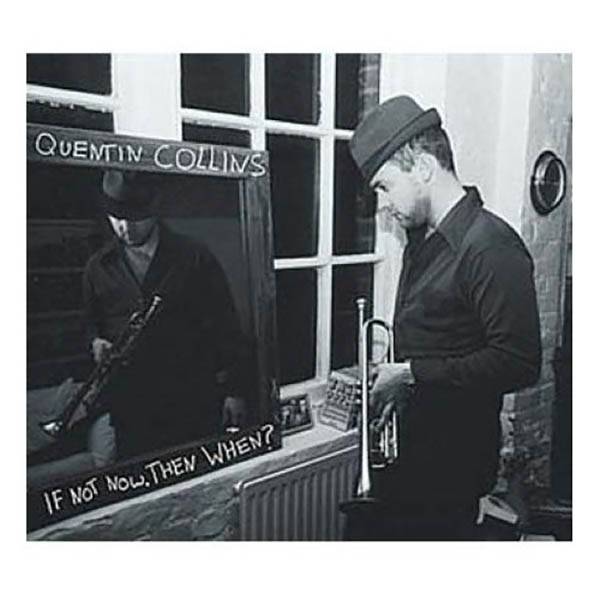
by Ian Mann
January 06, 2010
/ ALBUM
Fiery, bop inspired playing from this excellent young trumpeter and his equally impressive colleagues
This album was released in 2006 but was recently given to me for review purposes by trumpeter Quentin Collins at the recent Transatlantic Collective gig at Dempsey’s in Cardiff, a show reviewed elsewhere on this site at http://www.thejazzmann.com/reviews/review/the-transatlantic-collective-dempseys-cardiff-17-11-2009/.
Collins is one of the UK’s leading trumpeters, his hard hitting style ideally suited to jazz, funk and soul contexts. As well as his role with Transatlantic Collective and his work as a solo artist Collins also leads the blistering organ driven combo Drugstore Cowboy alongside tenor saxophonist Brandon Allen. Add in numerous other sideman gigs and session work and it becomes clear that the in demand Collins is a pretty busy boy.
This quartet recording finds Collins lining up alongside Transatlantic Collective colleagues Jim Hart (vibes) and Michael Janisch (double bass) plus explosive Scottish drummer Alyn Cosker. Guest saxophonist Tony Kofi drops by to add his distinctive alto to a couple of numbers including “Thelonious Monk’s “Four In One”.
The material, a mix of Collins originals plus pieces by Monk, John Coltrane and more surprisingly Gabriel Faure’s “Pavane”, emphasises Collins’ love of the hard bop style of the late 50’s and early 60’s. Cosker’s powerful drumming and Hart’s dazzling vibraphone work sit well in this context and both feature strongly on the knotty, boppish opening title track alongside Collins’ bright, open horn trumpeting. Unfortunately the sound of Hart’s vibes seems to dampened or treated, robbing them of some of their clarity. This may however be intentional, serving to emphasise the bell like quality of Collins’ playing. Both men feature extensively, trading ideas above the sturdy rhythms laid down by Janisch and Cosker. The drummer also gets to demonstrate his formidable abilities in the tune’s closing moments.
Mr Q.C. (great title) is another slice of earthy bebop with Hart’s vibes now adopting a hard, percussive sound. Collins lithe trumpeting and Cosker’s crisp and energetic drumming are also to the fore, the whole propelled by Janisch’s huge bass sound.
Faure’s “Pavane” is an interesting choice for a band essentially rooted in hard bop. It’s substantially different to what has gone before with Janisch’s eerily atmospheric arco bass on the intro. Collins’ mournful trumpet accompanied by Cosker’s rolling thunder drums and cymbal washes comes in as Janisch continues his work with the bow. After this dramatic intro Hart’s gently shimmering vibes take over for the tune’s mid section before Collins brooding, expressive trumpet returns. Taken as a whole this is a dramatic and starkly beautiful interpretation of a powerful piece of work and in many ways the most impressive piece thus far.
Monk’s slippery “Four In One” adds Tony Kofi’s alto to the front line, his splendidly dry alto taking the first solo. Collins follows, shadowed by Janisch and Cosker, as his trumpet solo builds in intensity. The rhythm team then have their own feature, Janisch’s bowed bass trading phrases with Cosker’s drums before Monk’s quirky head returns. Hart retains a low profile here, his role being essentially a supportive one.
The vibes man features more extensively on Collins’ “Sly Street” where he adopts a retro “electra-vibes” sound, soloing above Cosker’s complex drumming and Janisch’s insistent bass pulse. Collins trumpet flares brightly as the leader delivers some fiery lines. It’s fast , furious and frequently invigorating stuff with Cosker and Hart featuring powerfully just before the close.
Collins’ “Glad To Be S.A.D.” is a flugel horn feature with the composer’s rounded tones used to good effect on the album’s only ballad, albeit a somewhat abstract one. Janisch’s pizzicato technique is also heard at it’s best on an impressive solo as Hart and Cosker chatter around him. Hart too, catches the ear with a bell like solo that demonstrates his customary brilliance.
Coltrane’s “26-2” takes the album storming out in energetic, boppish fashion with guest Kofi again taking the first solo, his playing lithe, his tone biting. Collins’ Hubbard like trumpet more than matches him and there is also a feature for the flying mallets of Hart.
“If Not Now, Then When?” is an enjoyable album full of fast and fiery playing with memorable solos and all round contributions from all the participants. Most of it is rooted in bop but for all the pyrotechnics it is perhaps the quartet’s stunning version of “Pavane” that is the stand out cut. If some of the other pieces are a little “hard bop by numbers” despite the extraordinary skill of the playing the dramatic treatment of “Pavane” suggests other, more impressionistic avenues for Collins to explore. In the meantime this joyous, unpretentious album is well worth hearing.
blog comments powered by Disqus